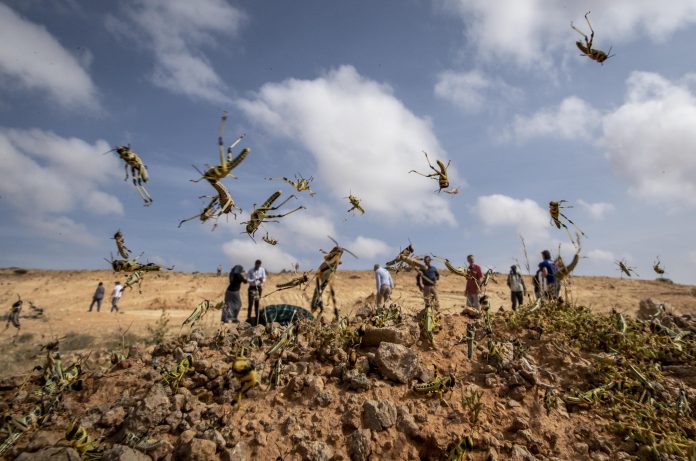KANCHOMBA, Zambia- One of the world’s oldest and most destructive insects is wreaking havoc in Africa.
Hundreds of millions of locusts are eating their way through the continent, putting crops, food security and millions of lives at risk.
It’s almost like a page out of the Bible’s Old Testament book of Exodus. Authorities are calling it the worst outbreak in decades as billions of desert locusts swarm across a large part of East Africa.
(Map showing swarms of locusts spreading across Horn of Africa)
“Today locust swarms are as big as major cities and this is getting worse by the day,” warned Antonio Guterres, secretary-general of the United Nations. “I ask the international community to respond with speed and generosity to ensure an effective response and control the infestation while we still have the chance.
Experts say the average swarm can contain up to 150 million locusts, travel 100 miles in a single day and grow as large as 250 football fields.
“That swarm in one day can eat the same amount of food as the entire population of Kenya,” said Keith Cressman, an expert with UN’s Food and Agriculture Organization (FAO). “That swarm in one day can eat the same amount of food as everybody here in the tri-state area – New Jersey, Pennsylvania, and New York.”
Desperate farmers in rural eastern Kenya are using blankets and other clothing or beating on pots and pans — to chase away the hungry pests. But it’s doing very little to stop them from devouring crops.
“We know that in Ethiopia there are about 420 square kilometers that have been affected so far,” said Rosanne Marchesich, an emergency response team leader with the United Nations. “There has been extensive crop damage in those areas and as it moves to other parts of the country, we expect that the impact it will have on food security and agricultural livelihoods, both for the farmers and the pastoralists, can be significant,” added Marchesich.
And now the UN is warning the swarms of the fast-breeding insects could grow more than 500 times between now and June.
“I’m seeing a big catastrophe ahead and a very big food security concern if we don’t address this problem immediately,” said a worried farmer in rural Kenya.
Caught in the path are some 19 million people, who’ve already dealt with severe food shortages. Now they face another looming catastrophe.
“The window to contain this crisis is closing fast,” warned Qu Dongyu, FAO’s director-general. “The swarms are highly mobile; the terrain often difficult; the logistical challenges immense. But left unchecked – and with expected additional rains – locust numbers in East Africa could increase 500 times by June.”
The United Nations is sending urgent appeals while infected countries deploy thousands of troops and use planes to spray pesticides against the destructive bugs.
“It gives you a sense of the scale of the crisis we are facing and we need to address it immediately,” said Dominique Burgeon with FAO.
The countries of Sudan, Eritrea, Somalia, Ethiopia, and Kenya are facing what experts say is the worst locust infestation in nearly 70 years. Earlier in the week, authorities spotted locust swarms crossing the border into Uganda and Tanzania. South Sudan is also at risk.
(Courtesy: World Vision)
For local farmers further south in countries like Zambia, they are facing another crisis — the lack of water.
Two years of little to no rain and failed harvests have forced 28-year-old Consepter Hamalambo to abandon her cornfields again this year.
She’s among some 2 million in this country facing food insecurity.
“I didn’t harvest any crops last year or this year due to the drought which forced me to look for work elsewhere,” Hamalambo told CBN News. “I’ve been going door-to-door asking people in my village for work just so I can buy some food.”
(Courtesy: World Vision)
World Vision, the Christian aid group, is distributing maize meal, drought-resistant maize seed, and cowpeas to families hardest hit by the drought.
“There’s not enough water to generate electricity so businesses and companies have 15 hours, 16 hours of no electricity a day,” Mark Kelly with World Vision Zambia told CBN News. “That also has an impact on people being able to earn money, that has an impact on being able to buy food.”
(Courtesy: World Vision)
While locusts haven’t hit Zambia yet, farmers here worry the massive swarm sweeping across much of east Africa could fly further south bringing destruction to a region already reeling from extreme weather.
All Content & Images are provided by the acknowledged source



